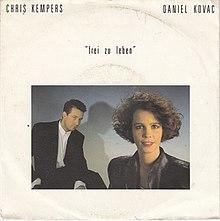 | |
| Eurovision Song Contest 1990 entry | |
| Country | |
| Artist(s) | Christiane Kempers, Daniel Kovac |
| As | Chris Kempers and Daniel Kovac |
| Language | |
| Composer(s) | Ralph Siegel |
| Lyricist(s) | |
| Conductor | Rainer Pietsch |
| Finals performance | |
| Final result | 9th |
| Final points | 60 |
| Entry chronology | |
| ◄ "Flieger" (1989) | |
| "Dieser Traum darf niemals sterben" (1991) ► | |
"Frei zu leben" (English translation: "To live freely") was the German entry in the Eurovision Song Contest 1990, performed in German by Chris Kempers and Daniel Kovac.[1][2]
The song was composed German Eurovision veteran Ralph Siegel[3] with lyrics by Michael Kunze, this was Kunze's third Eurovision entry, he had previously written the lyrics to Silver Convention's "Telegram" in 1977 and Mary Roos's "Aufrecht geh'n" in 1984.
"Frei zu leben" was performed thirteenth on the night (following Switzerland's Egon Egemann with "Musik klingt in die Welt hinaus" and preceding France's Joëlle Ursull with "White and Black Blues"). At the close of voting, it had received 60 points, placing 9th in a field of 22.
The song is a love duet, with the singers telling each other that when they are together they are free to be themselves and connect with the rest of the world around them. Kempers and Kovac also recorded the song in English and French, entitled "Wings of Freedom" and "Laissez vivre" respectively. A Serbo-Croatian version was also recorded as "Sretni Dani", Daniel Kovac being from Yugoslavia.
It was succeeded as German representative at the 1991 contest by Atlantis 2000 with "Dieser Traum darf niemals sterben".
References
- ^ "Chris Kempers and Daniel Kovac - Germany — Zagreb 1990". eurovision.tv. Retrieved 2020-09-23.
- ^ Sollazzo, Giuseppe (2018-05-11). "When the EU won Eurovision... and what it teaches us about Brexit". The New European. Retrieved 2020-09-23.
- ^ "BBC One - Eurovision Song Contest - San Marino". BBC. Retrieved 2020-09-23.
External links
| Preceded by "Flieger" by Nino de Angelo | Germany in the Eurovision Song Contest 1990 | Succeeded by "Dieser Traum darf niemals sterben" by Atlantis 2000 |